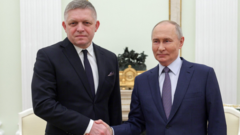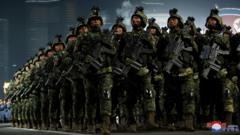In a new move by Russian authorities, individuals facing criminal charges are being pressured to join the army in exchange for halted prosecutions. With cases like that of Olympic medallist Andrey Perlov illustrating the lengths to which the government will go to replenish military ranks, this development has profound implications for justice and human rights in Russia.
Coercing Soldiers: Accused Russians Offered Military Service Over Court Trials

Coercing Soldiers: Accused Russians Offered Military Service Over Court Trials
A controversial policy in Russia allows those accused of crimes to enlist in the military as an alternative to facing trial, raising ethical concerns over coercion and human rights.
The recent escalation of Russia's military engagement in Ukraine has prompted controversial changes to the nation's judicial practices, particularly regarding individuals accused of crimes. Under alarming new legislation, anyone facing prosecution can choose to enlist in the army as an alternative to court proceedings. This policy has gained traction as authorities seek to bolster military numbers, arguably at the cost of legal integrity and human rights.
Among those ensnared in this troubling web is Andrey Perlov, a former managing director of a football club in Novosibirsk and an Olympic gold medallist in race walking. Accused of embezzling approximately three million roubles ($32,000), Perlov's family asserts the charges are baseless. Now in confinement for over six months, they claim he is being coerced to accept military service in Ukraine—promising that the charges against him would be frozen and possibly dismissed following the conflict's resolution.
The implications of this policy reach far and wide, as experts note a significant shift in law enforcement practices. Olga Romanova, director of the NGO Russia Behind Bars, underscored this transformation, critiquing what she defined as a legal system turned topsy-turvy. Under the new laws, defense and prosecution lawyers must inform accused individuals of their military enlistment option, effectively halting ongoing investigations and court cases. This creates a perverse incentive structure within the justice system that raises serious ethical questions.
Reports reveal that lower-level offenders, too, have seized upon the opportunity to avoid prison sentences. Teenager Yaroslav Lipavsky signed a military contract, fleeing potential prosecution but tragically lost his life shortly after his deployment. This serves as a grim reminder of the risks involved for those coerced into combat in lieu of facing potential legal consequences.
Despite unclear statistics surrounding the number of individuals recruiting for military service over trial, the policy undoubtedly underscores Russia's urgent need for manpower. Military analyst Michael Koffman emphasized that the government likely regards these individuals as expendable, assuming their loss won't severely impact the country's socio-economic fabric.
The controversial practice of prisoner recruitment first gained notoriety with the Wagner Group, which initially targeted high-security inmates. However, the current policies blur the lines, extending offers to individuals who have not yet been convicted, further muddying ethical waters in the ongoing war effort. Confidential documents illustrate the scale of recruitment, with approximately 50,000 inmates mobilized, depicting a stark reality of sacrifice on the battlefield.
Detainees and their families have reported immense pressure to enlist, with threats and intimidation tactics increasingly common. Alina Perlov, Andrey's daughter, noted the grim circumstances surrounding her father's situation; after rejecting the contract multiple times, he faced solitary confinement as retaliation.
As the situation develops, scrutiny surrounding the ethical implications of such coercive practices looms large. With significant concerns regarding human rights violations, the lack of response from Russian authorities only amplifies the anxiety surrounding this controversial policy.





















